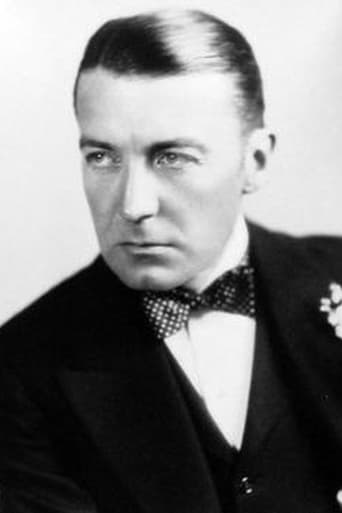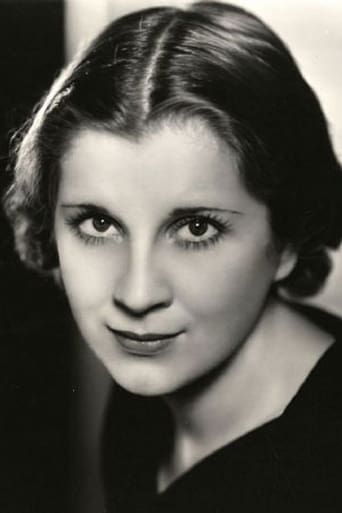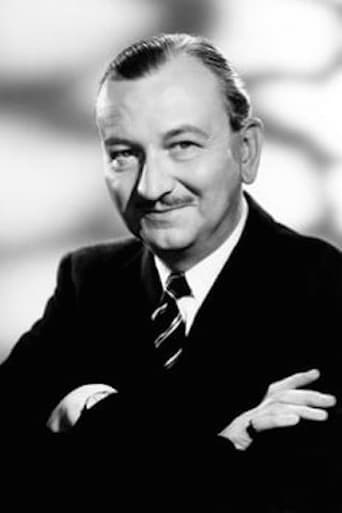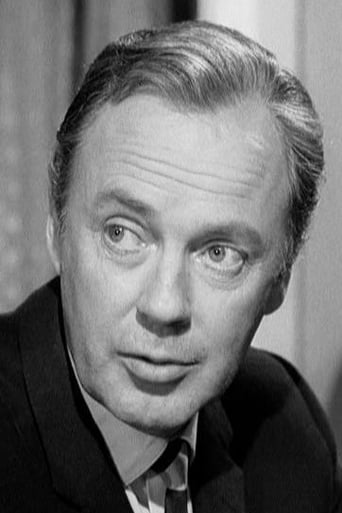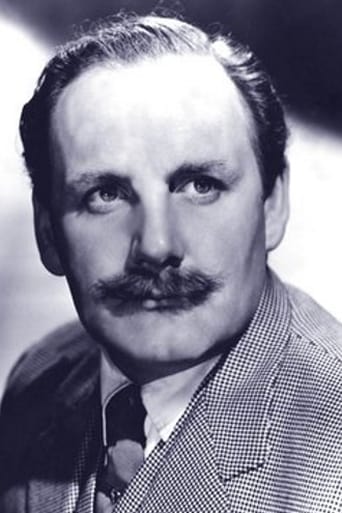StyleSk8r
At first rather annoying in its heavy emphasis on reenactments, this movie ultimately proves fascinating, simply because the complicated, highly dramatic tale it tells still almost defies belief.
James Owen
This is the sort of intelligent movie you simply won't meet with in modern cinema. Yes, it's blatant propaganda, and yet the film serves so much more as a clarion call for justice, civility, and yes, freedom too. What we have in the lead character, Dr. Roder has got to be one of the most real, most believable and admirable heroes in of cinema.My advice is don't get bogged down with the occasional stuffiness of the production, enjoy this exultation on the bravery inside those who are able to stand up for what they believe in.It's a shame Freedom Radio will only ever get seldom showings on obscure channels in the mid-afternoon. This is the sort of film we'd do well to show in history classes.
mail-671
An interesting fact about "Freedom Radio" is that Warners had beaten 2 Cities to it the previous year with the much grimmer & hard hitting "Underground" where the principal exponents were 2 brothers - one a defiant anti-nazi & the other a committed party member - one set against the other against a background of terror & mistrust under a merciless Gestapo regime. This is by far the superior treatment and establishes a suspenseful,dangerous atmosphere where serious infractions like listening to or indeed operating subversive radio transmissions intending to tell the truth about nazi policies invite the severest punishments. Basically,"Freedom Radio" narrates a similar situation from a British viewpoint and with a distinctly British cast of well known players in what was an early piece of propaganda from Asquith whose family politics were well set. It is a polished production under a wartime budget with cameos by several well known players of the day. Raymond Huntley/Clifford Evans & unbelievably Bernard Miles strut around resplendant in immaculate & bemedalled Gestapo suits with young Derek Farr and Joyce Howard caught up in the plot to aid wealthy dentist Clive Brook finally act in defiance of the regime that needs to strangle the truth. The Truth was not out there & Brook has a marital struggle to convince Diana Wynyard- a firm party sympathyser & keep his actions from reaching her nazi friends. Brook & Wynyard were no strangers to the stage and had the leads in Noel Coward's "Cavalcade"(1933). The former has also played Sherlock Holmes & prior to FR was a stiff upperlipped naval officer in Ealing's early WW2 naval epic "Convoy". Diana Wynyard made a name for herself in the lead of "Gaslight" on stage & on screen before MGM reprised it with Ingrid Bergman and tried to suppress the former. "Freedom Radio", again is studio-bound but this does not affect the story. Some dialogue is of the day and the edited newsreel inserts are obvious. A twist in the plot has one of the nazi leads a sympathyser & a nice,moment of suspense as Derek Farr,the radio technician infiltrates a huge Party gathering under the nose of a suspicious armed guard and cuts the connections relaying a speech by Hitler. There are several witty lines such as mentioned by earlier critics & direction is above average as should be expected from "Puffin" = Cottage On Dartmoor"/"Pygmalion"/"Way To The Stars" & "The Winslow Boy".As an ex-RAF Wireless Op I appreciated the Gestpo method of searching out the illegal transmissions using the old 2-beam method of DF.In fact,this might just get a rough location of a strong signal but a third beam would be much more accurate as used some years later by the FBI in "White Heat" when hunting down Ma Cody in her bugged car. There's a touch of irony when the ending of FR parallels that of "Underground" in that the Truth will not be silenced by mere suppression.
Igenlode Wordsmith
The title isn't promising, and certainly I could find nothing but disparagement for "Freedom Radio" when I looked it up before today's broadcast: 'tedious propaganda drama' (programme guide), 'outdated and unintentionally funny... accents totally unsuited to middle-European characters' (Radio Times). Maltin, meanwhile, doesn't even bother to give it a mention.So I was very pleasantly surprised to find it an intelligent drama about Germans in the 1930s who gradually come to realise that their country is becoming more and more totalitarian, and are pushed into an attempt at redressing the balance with the only weapon they can think of: the conviction that if only, somehow, they can get the truth out there, things will change. For our part we know, of course, that it didn't work; even they know they won't be able to get away with it indefinitely (although having an ally on the inside can prove invaluable...) But in a world where friends and neighbours are swept up by national loyalty and propaganda or become informers for their own personal profit, in a Nazi Germany that is not yet at war -- even a gesture at resistance can give hope.As a propaganda piece this is quite extraordinarily restrained: the entire cast are played (hence the 'accents' jibe -- might the reviewer have found comic Teutonic vowels less disturbing, perhaps?) as people 'like us', as ordinary Englishmen and women of the period, from the young workman to the nosy neighbour and the Society doctor. The young artist Otto, whose SS work gradually takes over his life, has the vocabulary of a thoughtless young public-school-boy; the Gestapo officer Rabenau who tracks the heroes down is an upright and keen-eyed Intelligence commander who could have stepped out of Fighter Command HQ, not a Prussian caricature. When you consider that the film was made in the darkest days of the Second World War, the decision not merely to show 'good Germans', but to show 'bad Germans' -- Nazi loyalists -- as human (and to eschew the use of heavy foreign accents to represent foreigners speaking in their own language) is impressive.If this film had been made in Hollywood, it would doubtless have featured a young Allied agent or second-generation American (like Karl von Austreim in Mary Pickford's "The Little American" of 1917 -- another film unfortunately written off as 'propaganda') to inspire the locals to acts of heroism. But there is no such facile audience-identification figure: we are forced to place ourselves in the position of pre-war Germans, those same Germans against whom the British cinema in 1941 might have been expected to whip up mindless hate. Instead, they're sympathetic characters. Some of them become ardent Nazi supporters; that doesn't make them less human. It only produces ultimately agonising conflict...Clive Brook, as ever, is superb as the thinking man's thinking man; Diana Wynyard brings conviction to the role of his wife, the actress whose talent brings favour from the Fuehrer himself. Raymond Huntley makes Rabenau a formidable yet admirable opponent who is never likely to be fooled for long, while the younger couple -- Derek Farr and Joyce Howard -- provide easy appeal to the eye as the young workman and his sweetheart.The production values betray a wartime budget: the obvious impossibility of shooting on location in Continental Europe, the stock footage of Nazi parades, and the restricted sets and shortage of extras -- for example, we only ever see Irena's stage triumphs from behind the curtain, and the Gestapo never seem to be able to muster more than half a dozen members at once. There is also a telltale moment when the supposed passage of the Budapest express is marked by the unmistakable shriek of an English locomotive whistle! The script, on the other hand, benefits from a similar parsimony. Little is stated outright if the information can instead be implied: especially in the opening sequences. We know the chilling truth behind the 'rest home' for an inconveniently hysterical witness -- the characters don't. Exposition is neatly avoided, and by and large the film displays an admirable subtlety and restraint. The exception, naturally, is in the rival radio broadcasts -- state propaganda on the one side, claims of debunking on the other -- and there were moments at the end when I felt that the content of the impassioned speeches was too obviously aimed at wartime audiences rather than the 1930s populace it supposedly addressed. But under the circumstances, and given the inevitable ending, the attempt at some kind of upbeat content is understandable.Frankly, the only reason I bothered to sit down to watch this in the first place was the presence of the names of Anthony Asquith and Clive Brook, both old friends from the silent era.... and I wasn't hoping for much. But I've seen some inferior films recently, and this, surprisingly, wasn't one of them: in fact, it reminded me rather of Leslie Howard's "Pimpernel Smith". Too 'British' for American viewers, perhaps: too 'outdated' for the modern generation. Personally, I found its depiction of a society of creeping totalitarianism both unsettling, and more than a little thought-provoking, even today.
